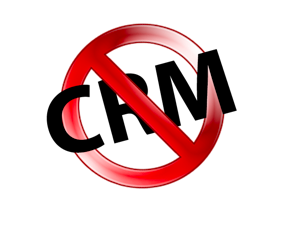Talking about CRM is sure to provoke huge amounts of discussion, pro and con, about these tools.
First, it’s a huge revenue generation sector for the CRM providers. I’m told it’s roughly $40B/annually. And I’m not certain that includes revenues for all the apps that depend on CRM.
Second, in spite of the billions we spend, a friend I trust says there is data showing utilization is around 26%.
I don’t know whether those are accurate data points, but I suspect they are pretty close.
As a colleague, Kevin Dixon, nets it out, “It seems everyone is paying a lot of money for something we don’t use.”
I’ve heard all the whining and complaints, from all parties, about CRM systems. “It takes too much time….. Do you want me spending my time entering data or do you want me to spend my time selling…. It’s just a tool for management to keep tabs on me….. The interface sucks (this is actually true for most systems)….. And on and on and on….”
And then there are the people that hide behind CRM—managers and sales people alike. There are those managers that believe CRM is the source of all insight into performance problems with the sales organization. “If we generate yet another report, we will be able to see what the problem is and how to fix it.”
Or, perhaps, worse than those that hide behind CRM, those that demand their people use it, but never use it themselves. Not long ago, a manager was complaining that his people weren’t keeping their opportunities updated. I asked him to show me some examples. He had to call someone into his office to find and open some opportunities.
There are endless issues that keep sales people, managers, and our organizations from getting the value from CRM they could. And we waste even more time complaining and whining about those issues.
The problem is less with the systems—and I’m not letting the leading suppliers off the hook. Most of their designs, even their newer versions are too complex. There are some new niche vendors who have spent a lot of time developing better user interfaces–yet they face similar compliance issues.
So what underlies the CRM compliance problem?
In my experience, it’s because sales people and managers don’t know how to leverage the systems to make them more productive, effective, efficient—even win more business.
This is less a training issue. Unfortunately, most to the training I see is “keystroke” training. It doesn’t directly address, “here’s how you leverage these tools to ……[be more effective, efficient, impactful, win more deals].” Sadly, even the front line sales people for the CRM vendors struggle with articulating this for their own jobs.
If we focus specifically on the why and how a person becomes much more effective, efficient, impactful productive and even winning a few more deals, we will not have a compliance issue. Once managers understand how to leverage the tool to identify areas where they can be most impactful in coaching and developing their people, they won’t hide behind their reports and they will leverage the tool to help themselves in driving the performance of their teams.
Compliance is an issue because we aren’t addressing the fundamental issue of “how does it help me perform better.” Until we focus on that, compliance will always be an issue and we will fail to get the return we should from our investments in CRM.

David, as usual, your timing is impeccable! I am attending our annual Sales Kickoff (SKO) and was just talking with our Director of Business Intelligence about this. You see, we merged 7 companies over the past 3 years and in 2019 transitioned the entire sales team (about 70 people in all) onto Salesforce. You are correct, the interfaces are not intuitive, but that’s not the problem. The problem is we teach keystrokes, to your point, and not how to use this as a tool to help our sales team “run” their business as an individual contributor for our organization. I am working to change that and your posts are helping me do that, lol! Keep it coming and I will let you know how we do in the coming months!
CRM Software is a tool. If you have bad processes it will help you do bad things even faster than ever.
It seems as though we often let people design the underlying processes and systems who aren’t involved in executing them. We let finance teams set the reporting requirements, which in turn drive the structure of the fields people have to fill out. IT teams tend to push for structures and processes that allow them to do their work most efficiently.
What starts out as a well-intentioned attempt to help the customer facing people in an organization ends up getting twisted into a cudgel for validating the “numbers”.
Just once I’d like to see a CRM screen that asks the salesperson to define the problem they are trying to solve for the customer. Far too often the only fields they have to fill out have to do with billing information and which products the customer may buy.